The availability of thyroid medications impacts thyroid patients, especially those who take ‘non-conventional’ medications such as NP thyroid.
Recently, I’ve been getting reports from some patients who have not been able to get NP thyroid from specific pharmacies, namely CVS.
A recent recall of both levothyroxine and liothyronine by Westminster pharmaceuticals on August 10, 2018, has led to an increase in demand for NDT (all formulations).
This demand was being met by NP thyroid, but now it seems that NP thyroid may be getting more difficult to get based on some recent changes from CVS pharmacy headquarters.
CVS & NP Thyroid
Due to these reports and the difficulty that some patients are experiencing in acquiring NP thyroid, I spent some time calling local CVS pharmacies and talking to pharmacists to figure out what is happening, and here is what I found:
CVS, as a pharmaceutical company, does not want to carry or fill NP thyroid.
Prior to this new change, it was already difficult to get NP thyroid stocked in each store.
This process required a call directly from the pharmacist to headquarters to get approval.
CVS headquarters wanted to ensure that pharmacists would first try to get approval from the doctor to switch to other medications or to try another alternative such as levothyroxine (which is obviously less than ideal for those taking NP thyroid).
It sounds as if this process was made more difficult on CVS’s end to encourage the use of other medications.
More recently, and this is perhaps why some patients are having more difficulty nowadays, CVS has made some changes in regards to whether or not they will stock NP thyroid.
According to the NP thyroid.com website, they have stated that the CVS pharmacies will no longer stock NP thyroid.
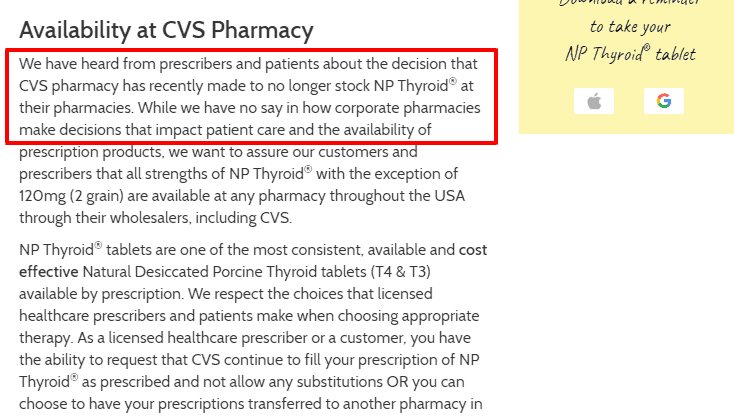
These new changes from CVS headquarters are what are causing the difficulty that patients have been experiencing.
The new changes (within the last few months), on the side of CVS, have made it more difficult for pharmacists to order NP thyroid.
Having said that, some CVS pharmacists have assured me that they are still able to order NP thyroid despite the fact that it will not be stocked in their pharmacies.
To get NP thyroid from a CVS pharmacy you must do the following:
- Call your local CVS store and specifically request that the pharmacist places an order for NP thyroid.
If you do this you should then be able to get your prescription filled.
According to the pharmacists that I’ve talked to about this topic, CVS headquarters would like all patients on NP thyroid to be switched to either Armour Thyroid or, preferably, levothyroxine/Synthroid.
Please be aware, however, that this will require an extra step from the pharmacist at your CVS office.
They may (or may not) be willing to take this extra step.
If this happens to you then there are some other options that I discuss below.
DOWNLOAD FREE RESOURCES
Foods to Avoid if you Have Thyroid Problems:
I’ve found that these 10 foods cause the most problems for thyroid patients. Learn which foods you should avoid if you have thyroid disease of any type.
The Complete List of Thyroid Lab tests:
The list includes optimal ranges, normal ranges, and the complete list of tests you need to diagnose and manage thyroid disease correctly!
How to get NP Thyroid
What should you do as a patient if it’s difficult to get your medication?
Well, you have a couple of options:
#1. Transfer your prescription to another pharmacy.
The easiest thing to do may be to simply request that you transfer your prescriptions to another pharmacy.
You can do this by calling the pharmacy and giving them the name and location of another pharmacy.
Pharmacies don’t like doing this, but it does send the message to them that if they aren’t willing to stock your medication you will move somewhere else.
You can fairly easily transfer all of your existing prescriptions to another pharmacy with a phone call.
#2. Call your CVS pharmacist and ask to see if they can fulfill your order and keep a stock of medication on hand.
If CVS is the only local pharmacy (or just the best price) then you can still try asking the pharmacist of your local CVS if they are willing to order each month for you.
This is not the best option, however, and it makes me nervous because this strategy doesn’t allow for much wiggle room.
For instance, what happens if your pharmacy forgets to fill your prescription one month?
If that occurs, and this stuff does happen from time to time, you may have no other way to get your medication or you must be switched to another alternative.

In this sort of situation, the pharmacy would definitely work with you to get you some type of medication, but it may not be what you are used to.
As a thyroid patient, you probably know that once you find what works for you, you really don’t want to deviate from that medication/dose unless absolutely necessary.
This is why I recommend that thyroid patients try to build up a 1 year supply of thyroid medication just to be safe.
#3. Switch to another NDT alternative.
This is probably the least attractive option but it may be your only option depending on your scenario.
Switching to another formulation of NDT seems like something that should be relatively easy but that isn’t always the case.
Each formulation of NDT differs in the inactive ingredients that it contains and these inactive ingredients can have a mild to profound effect on how you tolerate the medication.
The good news is that all of the NDT formulations contain the same amount of T4 and T3 grain for grain, which can make dosing relatively easy.
The bad news is that, upon switching, you may notice a slight difference in how your body reacts to or tolerates the new medication.
Some people, when switching NDT formulations, notice a resurgence in their hypothyroid symptoms or other mild symptoms such as stomach upset, headaches, or rashes.
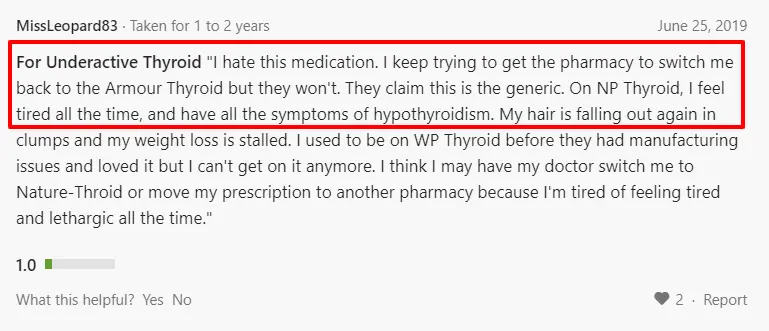
A resurgence in your hypothyroid symptoms is probably an indication that your new formulation is impacting your ability to absorb your new medication.
Whereas other mild symptoms such as headaches or rashes probably indicate that you are reacting negatively to the inactive ingredients.
It’s also possible, and hopefully, this is the case for most of you, that the switch will not result in any negative side effects or consequences and you will feel just the same afterward.
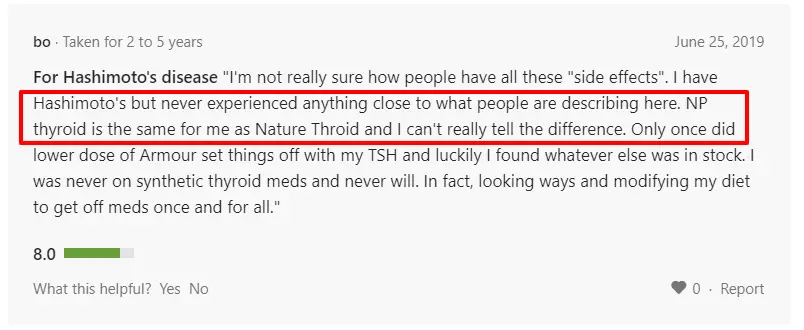
How you react will depend on too many factors to list here, but just realize that this may happen.
One potentially big downside of switching to a different formulation of NDT is the price.
NP thyroid is probably the most competitively priced NDT formulation on the market.
According to goodrx.com, a month’s worth of 1 grain of NP thyroid will cost you between $7.00 and $13.00 per month.
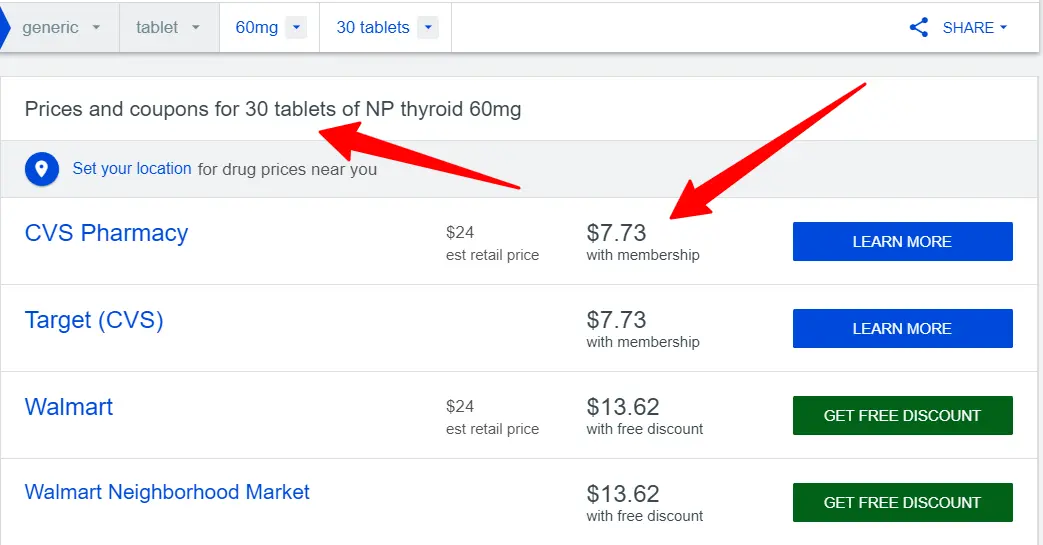
This is in contrast to other formulations like Armour thyroid which run about $28.00 to $35.00 per month.
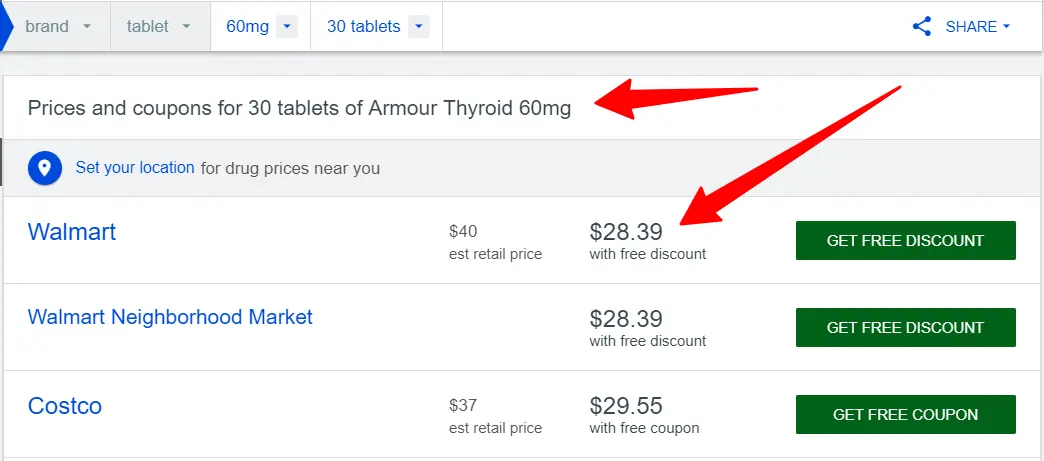
The difference between $7.00 and $28.00 may not be a lot for some people but it may be a big deal for others.
It’s just another thing you really don’t want to have to worry about.
#4. Switch to a T4/T3 combination that approximates your current dose.
Lastly, if all other options fail, then you do have the ability to try and switch to a combination of T4 and T3 medication.
You can do this by calculating how much T4 and T3 you are taking in your current dose and then attempting to approximate that dose with individual prescriptions for T4 and T3.
It’s not a perfect strategy, but it’s one you should be aware of, especially if you don’t tolerate other formulations of NDT.
As an example:
Imagine you are taking 1.5 grains of NP thyroid and now you are no longer able to get it.
How much T4 and T3 are in your dose?
Each grain of NP thyroid contains 38mcg of T4 and 9mcg of T3.
So 1.5 grains of NP thyroid contains 57mcg of T4 and 13.5mcg of T3.
Once you have this information you could ask your doctor to write a compounded thyroid prescription that contains exactly that amount of T4 and T3.
Note: you will need to go to a compounding pharmacy in order to get a prescription like this filled.
Conclusion
So, to recap, does this mean that NP thyroid is no longer available for thyroid patients at CVS?
It may seem that way but the answer is no.
But it does mean that it’s a little bit harder to get.
As a thyroid patient taking NP thyroid you will need to call directly into your local pharmacy and make a request that your pharmacist order NP thyroid on your behalf.
Most pharmacists should be accommodating to this request!
Remember:
There is a difference between stocking a medication and ordering it as necessary.
Some pharmacies do not keep all medications stocked at all times due to the fact that some medications are used less frequently than others.
But these medications can still be ordered by the pharmacist and a small stock can be maintained.
It looks like CVS no longer keeps a steady stock of NP thyroid but individual CVS pharmacies can still order it on demand.
The availability of NP thyroid from your local pharmacy will likely depend on how receptive your pharmacist is to ordering extra just for you (or a few others).
If all else fails, you still have other options that you can explore (listed above).
Now I want to hear from you:
Have you been having trouble getting your NP thyroid prescription filled?
Have you run into any trouble with CVS?
Have you been able to talk to the pharmacist to see if they would be willing to order NP thyroid specifically for you?
What has been your experience?
Leave your questions or comments below!
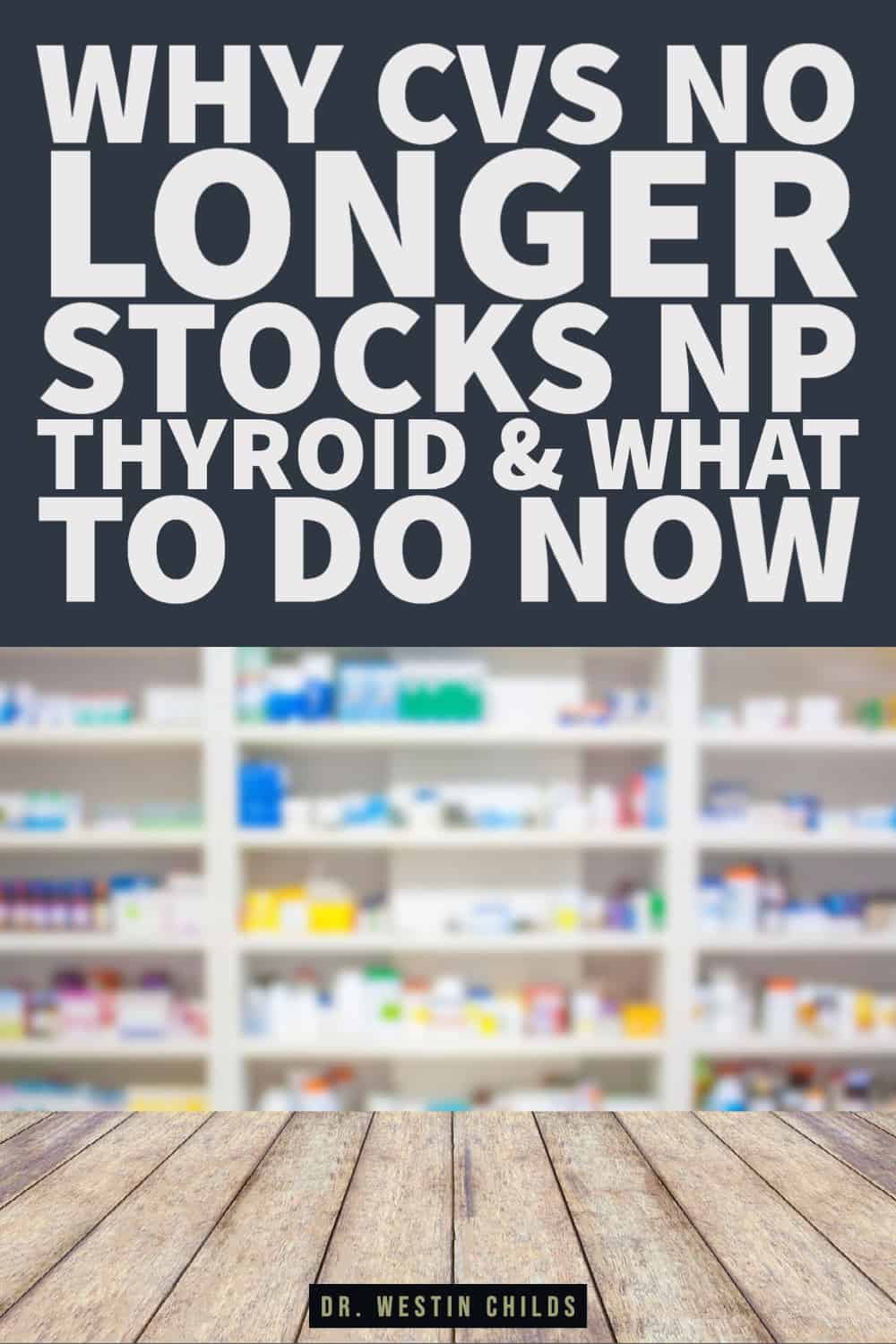
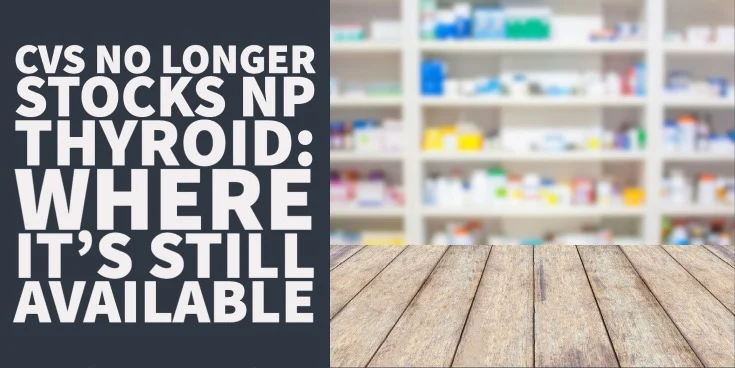



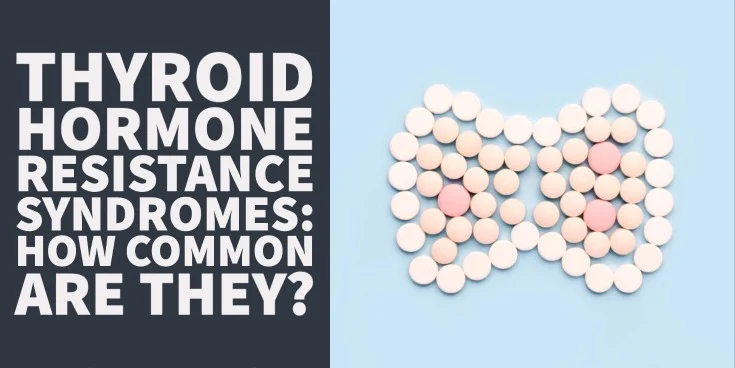

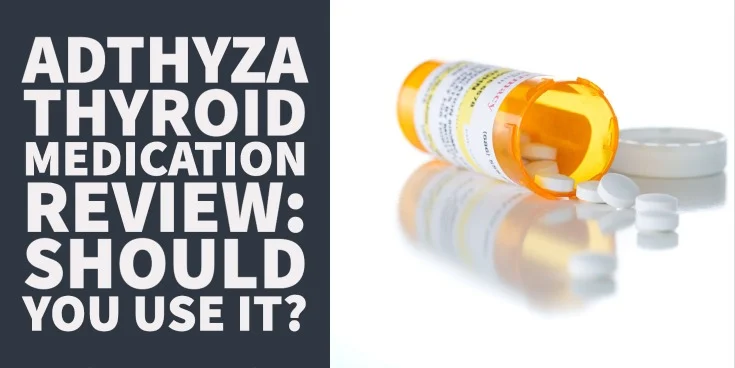

I just watched the video of how Google is suppressing information. I believe this to be true for quite a while now. Instead of being a broad search engine it seems they are directing you on which way to make a decision. They do NOT give you all the information. They have curtailed it to their reasoning (algorithms). I have also noticed that they give a broad range of information and not specifically what you are requesting. I personally try to not use google because of this. This company has gotten too big and is not regulated enough. I agree with dr. childs in his belief of Google not giving you the information you request. Or giving you skewed information based on the medical field and not wanting you to have all sides of the story. This has become acceptable to a lot of people so Google will continue this practice. Just like getting ads for supplements or services. They track you based on what you look for and then push their point of view on the subject.
Hi Kathie,
Thanks for sharing! And I definitely agree. If you want to see the article in more detail you can find it here: https://www.restartmed.com/is-google-suppressing-alternative-thyroid-information/
My CVS can’t seem to get nature thyroid. Tells me they are back ordered.
Hi Chris,
Naturethroid is in production but some places still have it on backorder. It takes a while for the pharmaceutical company to make enough to fill the demand.
I was switched from Synthroid .125 as my t4, quite low and TSH was 9.84. I was switched to NP 90. My TSH went to 14.34 and still low with other test but t3 wasn’t bad but I was dragging so she increased me to 120. Np. I asked for iodine urine loading test and it showed my iodine was 738. I am having terrible headaches, shaky, anxious, like crap!
I just got my test done today waiting for results. It seems as though I am getting too much iodine. I am taking your thyroid adrenal support as well as my women vitamins with 150 mcg iodine. I am so frustrated. I don’t know what to do. I am in doubt as to my doctor knowing either. I feel my head swooshing as I am hot cold-like BP is high and I am a fitness teacher and eat well. This is so not right. HELP
In Missouri Walgreens can get it in the 90mg & 15Mg but unfortunately CVS is my companies preferred pharmacy for my huge Discount$.
I really think it’s all about the money of tho$e who are making unnatural alternative drug$.
CVS kept telling me it was because of the recent Puerto Rican hurricane where they were made that they were hard to manufacture.
Folks, Keep up the pressure on CVS. Keep asking them.
I want and need it back.
Dr. Childs, can you please talk about WP thyroid. I was on a compounded T3, T4. No matter the dose, I never felt good. I am new to trying NP and an addl T3 liothyronine. Hoping this will work, but if not, I will know about WP with your help.
Also is Liothyronine the same as Cytomel?
Thank you for all you do.
Hi Dawn,
I have a complete article dedicated to WP Thyroid 🙂 You can read it here: https://www.restartmed.com/wp-thyroid-weight-loss/
You can also find more info about liothyronine + cytomel here: https://www.restartmed.com/liothyronine/
I live in Roanoke Virginia & about 2 years ago all main stream pharmacies ( Kroger, CVS, Walgreens, etc all stopped filling prescriptions for NDT). I ended up going to a private owned mom & pop pharmacy to get my monthly Nature Throid prescription. They always have it. Kroger told me they weren’t filling natural thyroid medication anymore along with the other mainstream pharmacies. I honestly believe big pharma doesn’t want patients on NDT.
Hi Stephanie,
They absolutely don’t want you to be on NDT, no question about it. They would 100% prefer that you be on levothyroxine and/or Synthroid. Very few people do thyroid studies nowadays and the only ones that do are sponsored by these big drug companies. Remember, levothyroxine is the #1 or #2 most commonly prescribed drug in the United States so there’s a big incentive not to push it down and everyone who uses NDT is someone who does NOT use levothyroxine. They will fight to maintain that dominance which may include purchasing the pharmaceutical companies that make NDT to alter/change it.
Hi Dr. Westin Childs,
Firstly, thank you for this website! There is a wealth of knowledge here that is so detailed and extremely informative. I used your guidance for my labs so I can better navigate my health, myself, being that doctors are not really invested. Thank you for that!
I’ve been on/off every med since 2012. On NatureThroid I felt healthy and alive! In June, TSH was 27.8! Asked for NP Thyroid and feel horrendous! What are your thoughts on Desiccated Bovine? I would like to swap out porcine with bovine once I reach TSH 2.
Hi Cindy,
Are you referring to thyroid glandulars or to another form of natural desiccated thyroid? Thyroid glandulars do not contain thyroid hormone but most versions of desiccated thyroid glands do: https://www.restartmed.com/thyroid-glandular-supplements/
I apologize, my post wasn’t clear. After reading your link, I now understand that Granular Thyroid does not contain T3/4. I was hoping to order directly and eliminate my incompetent doctor.
Once my TSH levels are under 1, and if I still feel crappy, I will get these.
Thank you for replying.
Hi Cindy,
No worries! It still may be possible to get off of your medication, I just wanted to make sure you were aware that glandulars do not replace thyroid medications: https://www.restartmed.com/do-you-have-to-take-thyroid-medication-for-life/
Thank you for this site. My charge for NP Thyroid has gone from $15.00 to $70.00 with CVS. They will fill it but it’s no longer on the preferred med list.
I have been on Armour Thyroid for years. When the price went up, I switched to NP Thyroid. I have been doing well on it; even though the price of it has also doubled in the last 3 years. I like to have 6 months extra thyroid meds on hand. Wal-Greens changed my NP Thyroid prescription to Thyroid, (an ANI substitute) without telling me. When I called, they said my insur wanted to use a generic. I pay out of pocket. My insur doesn’t cover NP Thyroid. I am mad because they won’t do anything about 2 bottles that I haven’t opened. I am disheartened that they aren’t required to tell us when they switch out meds.
Hi Marie,
Yeah, I agree that the ability to swap out medications without telling the patient is actually insane, especially when you are willing to pay cash for the alternative. It stems from the misconception that generics and brands are essentially identical which has proven to be false in many situations.
I have been taking NP Thyroid for several years now. Have been paying $40 copay for 90 day supply of 1.5g. Today I go to pick up refill and it increased to $121 copay! Wondering what is happening. Is it insurance or company price increase? What is best way to determine this?
Hi Rhonda,
Unfortunately, the price of all NDT formulations has been continually increasing. It’s to the point now that over the counter thyroid glandulars are cheaper than NDT formulations by a significant margin. I recently wrote about this here: https://www.restartmed.com/the-best-desiccated-thyroid-supplements/
The same thing applies to Armour thyroid which is routinely more than $100/month, at least right now.
The pricing of pharmaceutical medications varies based on many different factors, including where they source their materials, how difficult they are to obtain, what other options are available on the market, etc. Individual pharmacies can even charge different pricing if they so desire.